Attached files
| file | filename |
|---|---|
| EX-10.34 - EXHIBIT 10.34 - IVERIC bio, Inc. | davidcarrollletter1219.htm |
| EX-32.2 - EXHIBIT 32.2 - IVERIC bio, Inc. | isee12312019exhibit322.htm |
| EX-32.1 - EXHIBIT 32.1 - IVERIC bio, Inc. | isee12312019exhibit321.htm |
| EX-31.2 - EXHIBIT 31.2 - IVERIC bio, Inc. | isee12312019exhibit312.htm |
| EX-31.1 - EXHIBIT 31.1 - IVERIC bio, Inc. | isee12312019exhibit311.htm |
| EX-23.1 - EXHIBIT 23.1 - IVERIC bio, Inc. | isee12312019exhibit231.htm |
| EX-21.1 - EXHIBIT 21.1 - IVERIC bio, Inc. | isee12312019exhibit211subs.htm |
| EX-10.36 - EXHIBIT 10.36 - IVERIC bio, Inc. | keithwestbyletter1219.htm |
| EX-4.2 - EXHIBIT 4.2 - IVERIC bio, Inc. | iseestockcertificate.htm |
| EX-4.1 - EXHIBIT 4.1 - IVERIC bio, Inc. | exhibit41.htm |
| 10-K - 10-K - IVERIC bio, Inc. | iveric1231201910-k.htm |
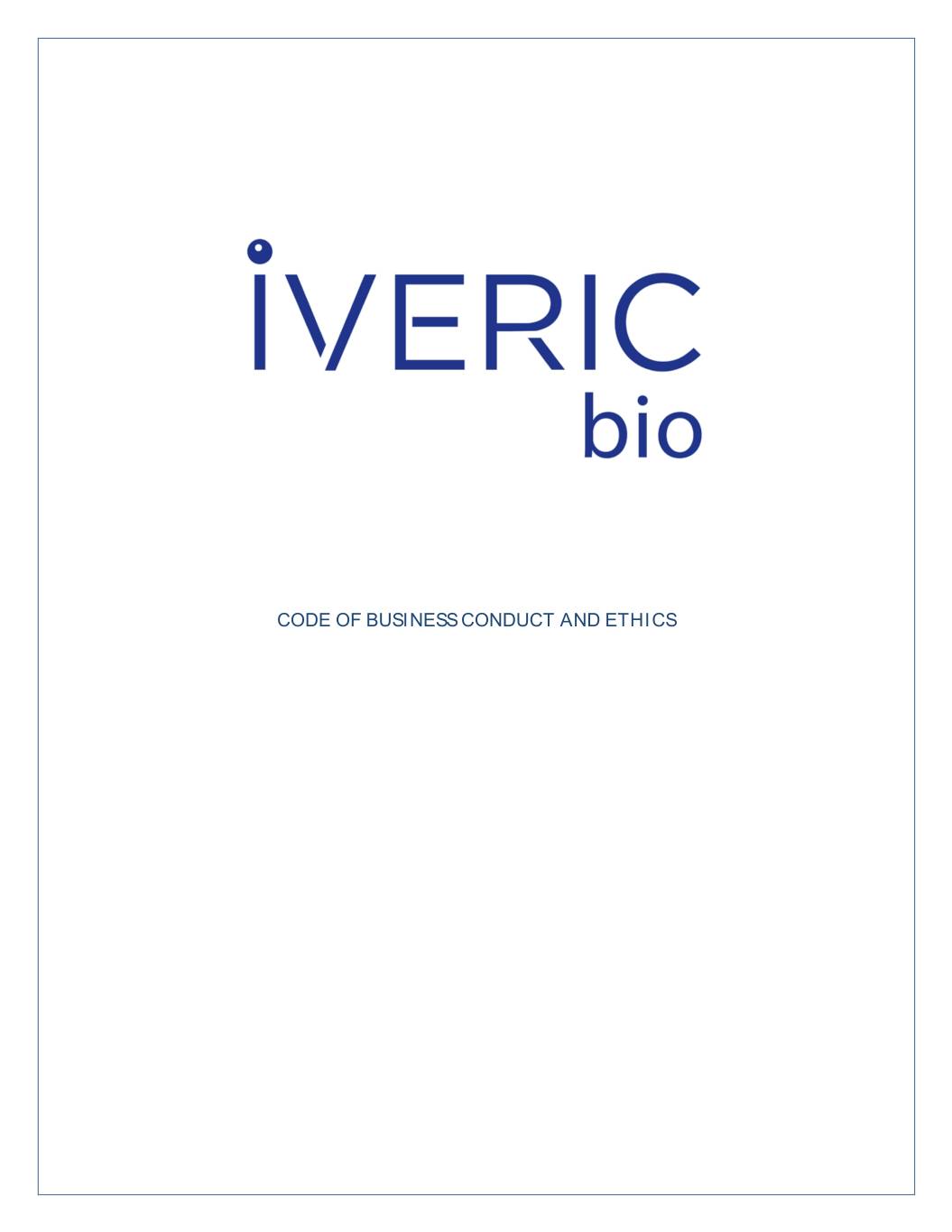
CODE OF BUSINESS CONDUCT AND ETHICS
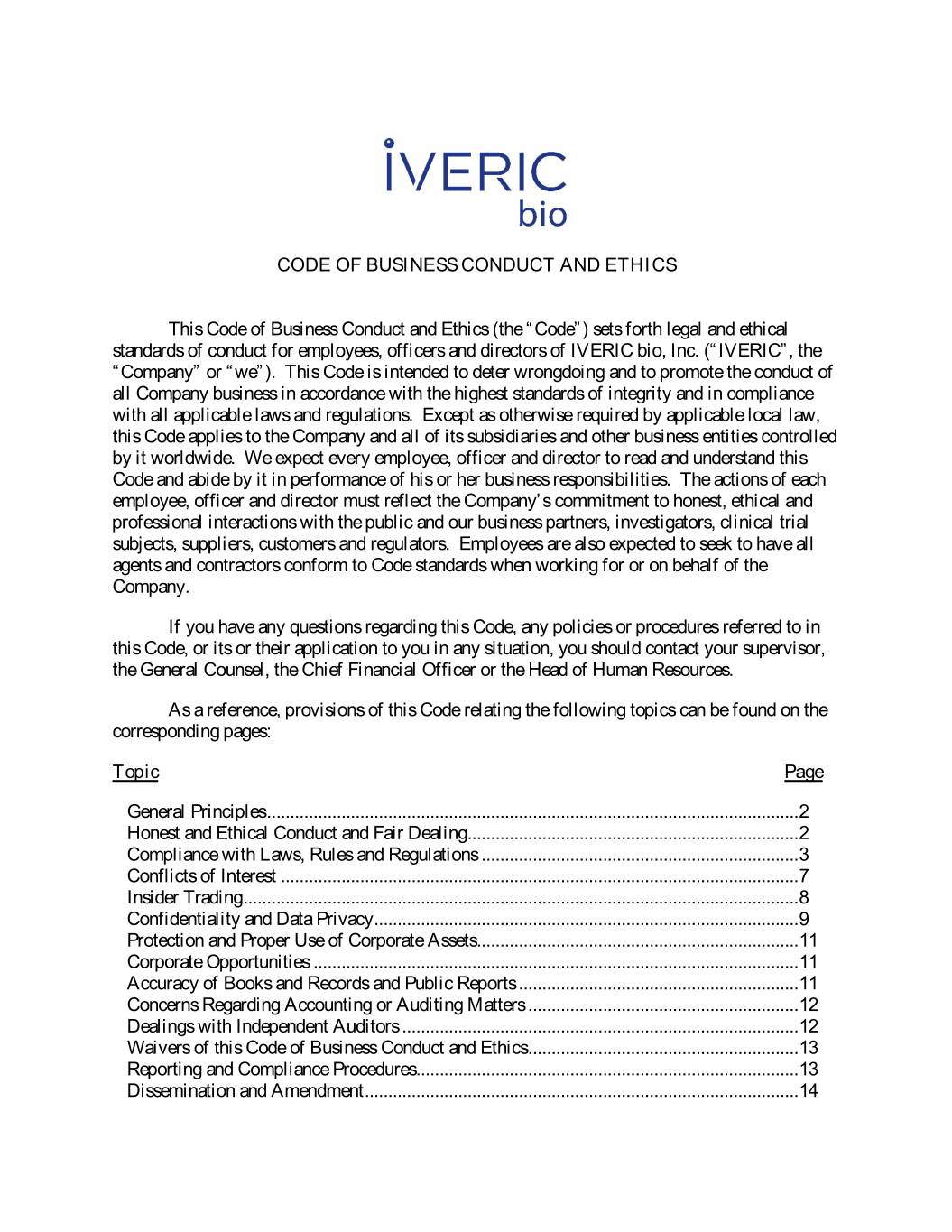
CODE OF BUSINESS CONDUCT AND ETHICS This Code of Business Conduct and Ethics (the “Code”) sets forth legal and ethical standards of conduct for employees, officers and directors of IVERIC bio, Inc. (“IVERIC”, the “Company” or “we”). This Code is intended to deter wrongdoing and to promote the conduct of all Company business in accordance with the highest standards of integrity and in compliance with all applicable laws and regulations. Except as otherwise required by applicable local law, this Code applies to the Company and all of its subsidiaries and other business entities controlled by it worldwide. We expect every employee, officer and director to read and understand this Code and abide by it in performance of his or her business responsibilities. The actions of each employee, officer and director must reflect the Company’s commitment to honest, ethical and professional interactions with the public and our business partners, investigators, clinical trial subjects, suppliers, customers and regulators. Employees are also expected to seek to have all agents and contractors conform to Code standards when working for or on behalf of the Company. If you have any questions regarding this Code, any policies or procedures referred to in this Code, or its or their application to you in any situation, you should contact your supervisor, the General Counsel, the Chief Financial Officer or the Head of Human Resources. As a reference, provisions of this Code relating the following topics can be found on the corresponding pages: Topic Page General Principles .................................................................................................................. 2 Honest and Ethical Conduct and Fair Dealing....................................................................... 2 Compliance with Laws, Rules and Regulations .................................................................... 3 Conflicts of Interest ............................................................................................................... 7 Insider Trading ....................................................................................................................... 8 Confidentiality and Data Privacy ........................................................................................... 9 Protection and Proper Use of Corporate Assets..................................................................... 11 Corporate Opportunities ........................................................................................................ 11 Accuracy of Books and Records and Public Reports ............................................................ 11 Concerns Regarding Accounting or Auditing Matters .......................................................... 12 Dealings with Independent Auditors ..................................................................................... 12 Waivers of this Code of Business Conduct and Ethics .......................................................... 13 Reporting and Compliance Procedures.................................................................................. 13 Dissemination and Amendment ............................................................................................. 14
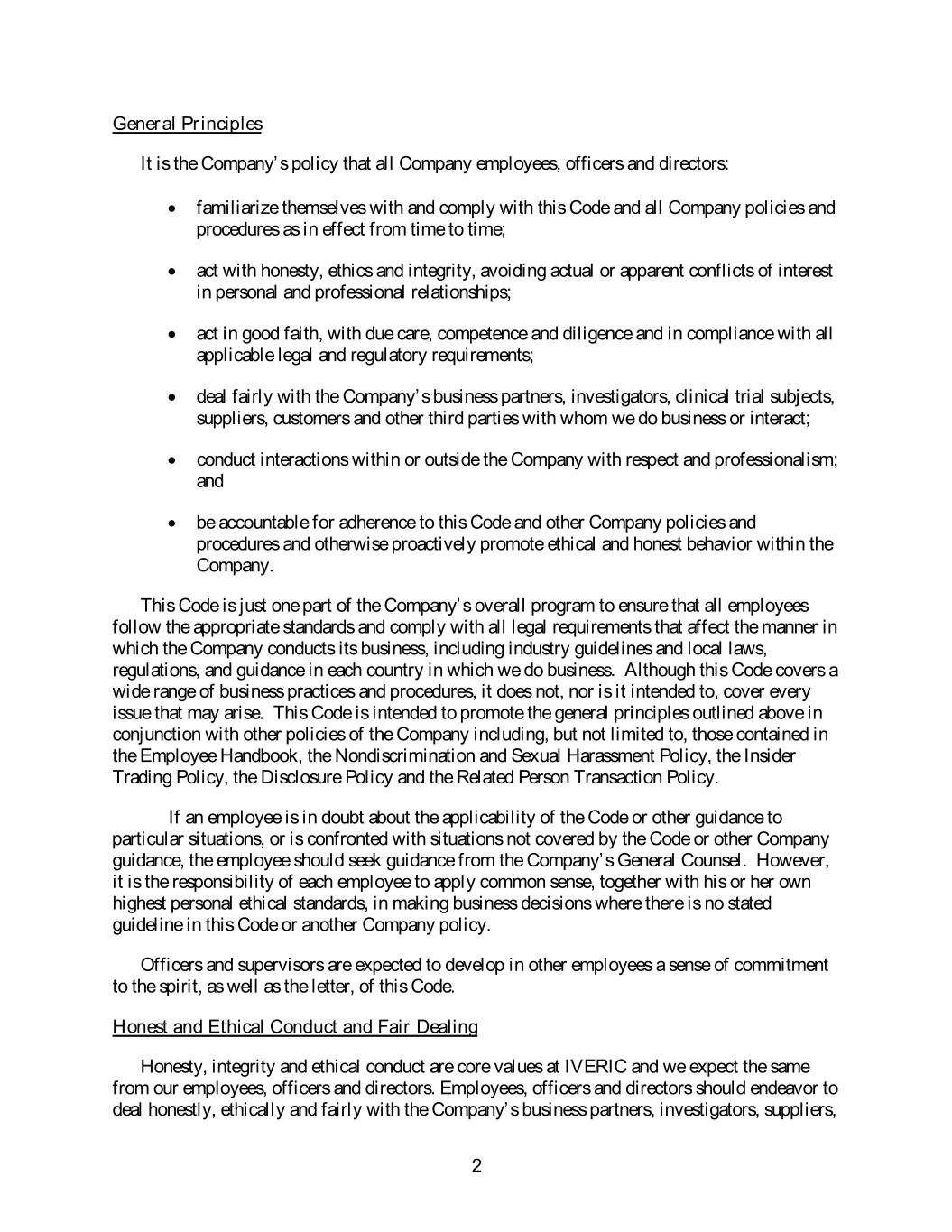
General Principles It is the Company’s policy that all Company employees, officers and directors: • familiarize themselves with and comply with this Code and all Company policies and procedures as in effect from time to time; • act with honesty, ethics and integrity, avoiding actual or apparent conflicts of interest in personal and professional relationships; • act in good faith, with due care, competence and diligence and in compliance with all applicable legal and regulatory requirements; • deal fairly with the Company’s business partners, investigators, clinical trial subjects, suppliers, customers and other third parties with whom we do business or interact; • conduct interactions within or outside the Company with respect and professionalism; and • be accountable for adherence to this Code and other Company policies and procedures and otherwise proactively promote ethical and honest behavior within the Company. This Code is just one part of the Company’s overall program to ensure that all employees follow the appropriate standards and comply with all legal requirements that affect the manner in which the Company conducts its business, including industry guidelines and local laws, regulations, and guidance in each country in which we do business. Although this Code covers a wide range of business practices and procedures, it does not, nor is it intended to, cover every issue that may arise. This Code is intended to promote the general principles outlined above in conjunction with other policies of the Company including, but not limited to, those contained in the Employee Handbook, the Nondiscrimination and Sexual Harassment Policy, the Insider Trading Policy, the Disclosure Policy and the Related Person Transaction Policy. If an employee is in doubt about the applicability of the Code or other guidance to particular situations, or is confronted with situations not covered by the Code or other Company guidance, the employee should seek guidance from the Company’s General Counsel. However, it is the responsibility of each employee to apply common sense, together with his or her own highest personal ethical standards, in making business decisions where there is no stated guideline in this Code or another Company policy. Officers and supervisors are expected to develop in other employees a sense of commitment to the spirit, as well as the letter, of this Code. Honest and Ethical Conduct and Fair Dealing Honesty, integrity and ethical conduct are core values at IVERIC and we expect the same from our employees, officers and directors. Employees, officers and directors should endeavor to deal honestly, ethically and fairly with the Company’s business partners, investigators, suppliers, 2
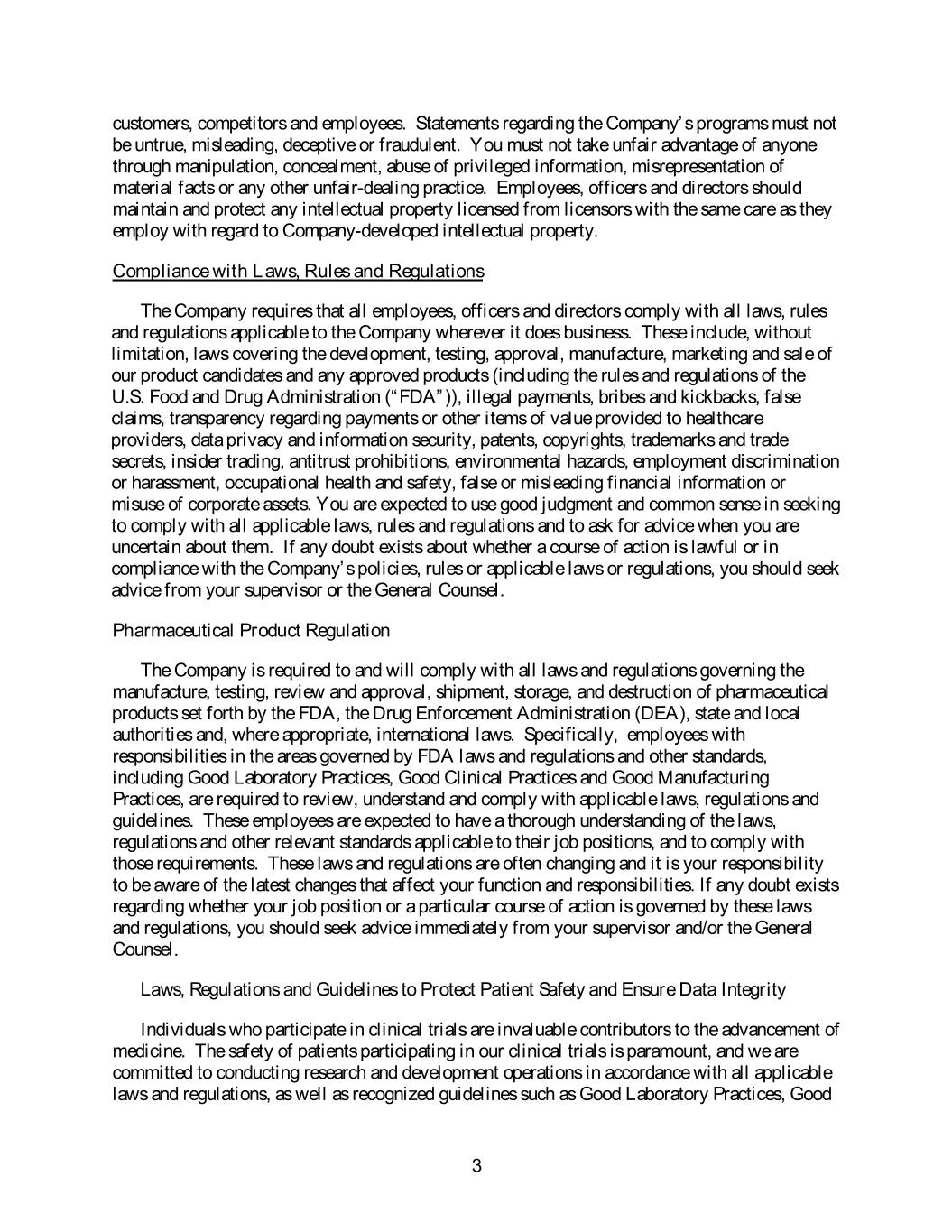
customers, competitors and employees. Statements regarding the Company’s programs must not be untrue, misleading, deceptive or fraudulent. You must not take unfair advantage of anyone through manipulation, concealment, abuse of privileged information, misrepresentation of material facts or any other unfair-dealing practice. Employees, officers and directors should maintain and protect any intellectual property licensed from licensors with the same care as they employ with regard to Company-developed intellectual property. Compliance with Laws, Rules and Regulations The Company requires that all employees, officers and directors comply with all laws, rules and regulations applicable to the Company wherever it does business. These include, without limitation, laws covering the development, testing, approval, manufacture, marketing and sale of our product candidates and any approved products (including the rules and regulations of the U.S. Food and Drug Administration (“FDA”)), illegal payments, bribes and kickbacks, false claims, transparency regarding payments or other items of value provided to healthcare providers, data privacy and information security, patents, copyrights, trademarks and trade secrets, insider trading, antitrust prohibitions, environmental hazards, employment discrimination or harassment, occupational health and safety, false or misleading financial information or misuse of corporate assets. You are expected to use good judgment and common sense in seeking to comply with all applicable laws, rules and regulations and to ask for advice when you are uncertain about them. If any doubt exists about whether a course of action is lawful or in compliance with the Company’s policies, rules or applicable laws or regulations, you should seek advice from your supervisor or the General Counsel. Pharmaceutical Product Regulation The Company is required to and will comply with all laws and regulations governing the manufacture, testing, review and approval, shipment, storage, and destruction of pharmaceutical products set forth by the FDA, the Drug Enforcement Administration (DEA), state and local authorities and, where appropriate, international laws. Specifically, employees with responsibilities in the areas governed by FDA laws and regulations and other standards, including Good Laboratory Practices, Good Clinical Practices and Good Manufacturing Practices, are required to review, understand and comply with applicable laws, regulations and guidelines. These employees are expected to have a thorough understanding of the laws, regulations and other relevant standards applicable to their job positions, and to comply with those requirements. These laws and regulations are often changing and it is your responsibility to be aware of the latest changes that affect your function and responsibilities. If any doubt exists regarding whether your job position or a particular course of action is governed by these laws and regulations, you should seek advice immediately from your supervisor and/or the General Counsel. Laws, Regulations and Guidelines to Protect Patient Safety and Ensure Data Integrity Individuals who participate in clinical trials are invaluable contributors to the advancement of medicine. The safety of patients participating in our clinical trials is paramount, and we are committed to conducting research and development operations in accordance with all applicable laws and regulations, as well as recognized guidelines such as Good Laboratory Practices, Good 3
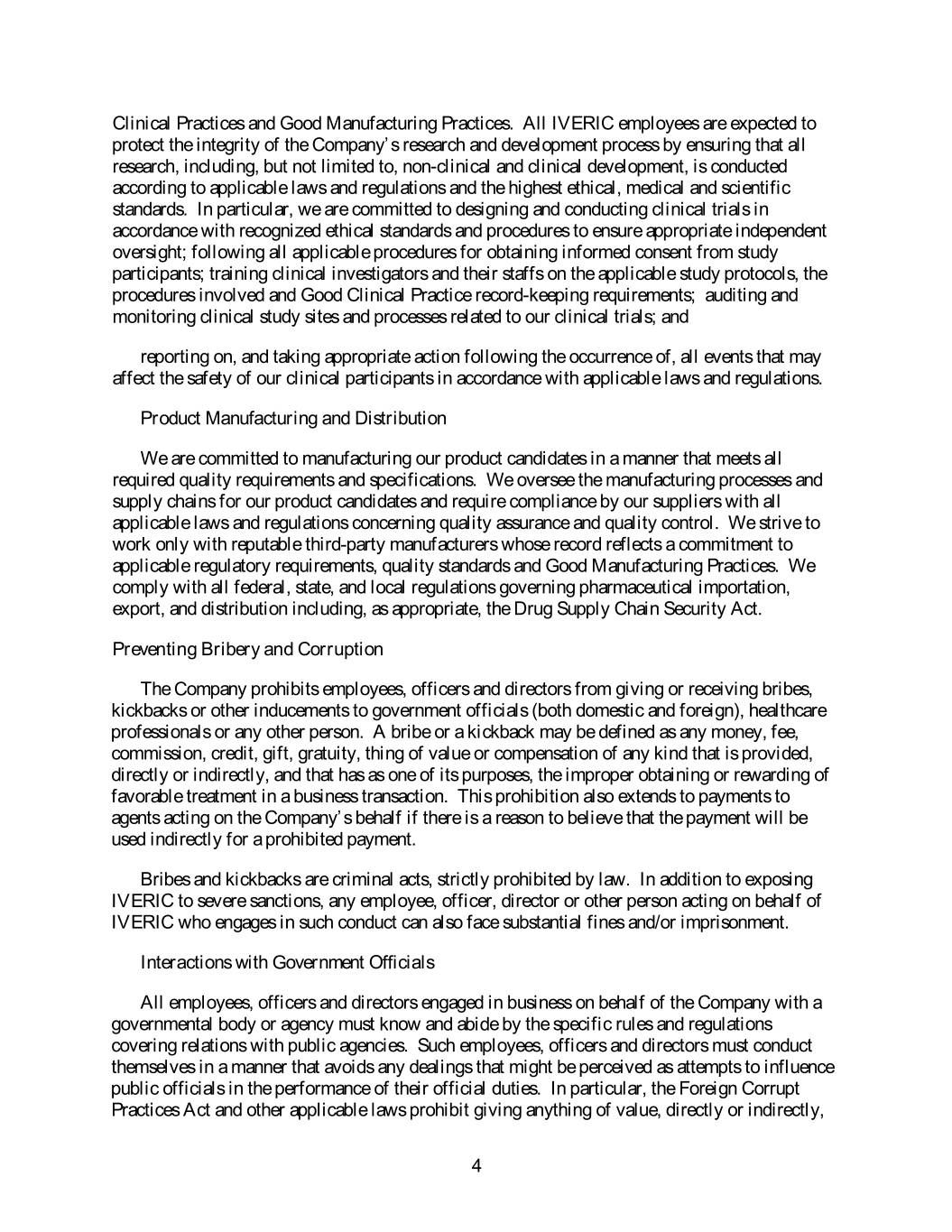
Clinical Practices and Good Manufacturing Practices. All IVERIC employees are expected to protect the integrity of the Company’s research and development process by ensuring that all research, including, but not limited to, non-clinical and clinical development, is conducted according to applicable laws and regulations and the highest ethical, medical and scientific standards. In particular, we are committed to designing and conducting clinical trials in accordance with recognized ethical standards and procedures to ensure appropriate independent oversight; following all applicable procedures for obtaining informed consent from study participants; training clinical investigators and their staffs on the applicable study protocols, the procedures involved and Good Clinical Practice record-keeping requirements; auditing and monitoring clinical study sites and processes related to our clinical trials; and reporting on, and taking appropriate action following the occurrence of, all events that may affect the safety of our clinical participants in accordance with applicable laws and regulations. Product Manufacturing and Distribution We are committed to manufacturing our product candidates in a manner that meets all required quality requirements and specifications. We oversee the manufacturing processes and supply chains for our product candidates and require compliance by our suppliers with all applicable laws and regulations concerning quality assurance and quality control. We strive to work only with reputable third-party manufacturers whose record reflects a commitment to applicable regulatory requirements, quality standards and Good Manufacturing Practices. We comply with all federal, state, and local regulations governing pharmaceutical importation, export, and distribution including, as appropriate, the Drug Supply Chain Security Act. Preventing Bribery and Corruption The Company prohibits employees, officers and directors from giving or receiving bribes, kickbacks or other inducements to government officials (both domestic and foreign), healthcare professionals or any other person. A bribe or a kickback may be defined as any money, fee, commission, credit, gift, gratuity, thing of value or compensation of any kind that is provided, directly or indirectly, and that has as one of its purposes, the improper obtaining or rewarding of favorable treatment in a business transaction. This prohibition also extends to payments to agents acting on the Company’s behalf if there is a reason to believe that the payment will be used indirectly for a prohibited payment. Bribes and kickbacks are criminal acts, strictly prohibited by law. In addition to exposing IVERIC to severe sanctions, any employee, officer, director or other person acting on behalf of IVERIC who engages in such conduct can also face substantial fines and/or imprisonment. Interactions with Government Officials All employees, officers and directors engaged in business on behalf of the Company with a governmental body or agency must know and abide by the specific rules and regulations covering relations with public agencies. Such employees, officers and directors must conduct themselves in a manner that avoids any dealings that might be perceived as attempts to influence public officials in the performance of their official duties. In particular, the Foreign Corrupt Practices Act and other applicable laws prohibit giving anything of value, directly or indirectly, 4
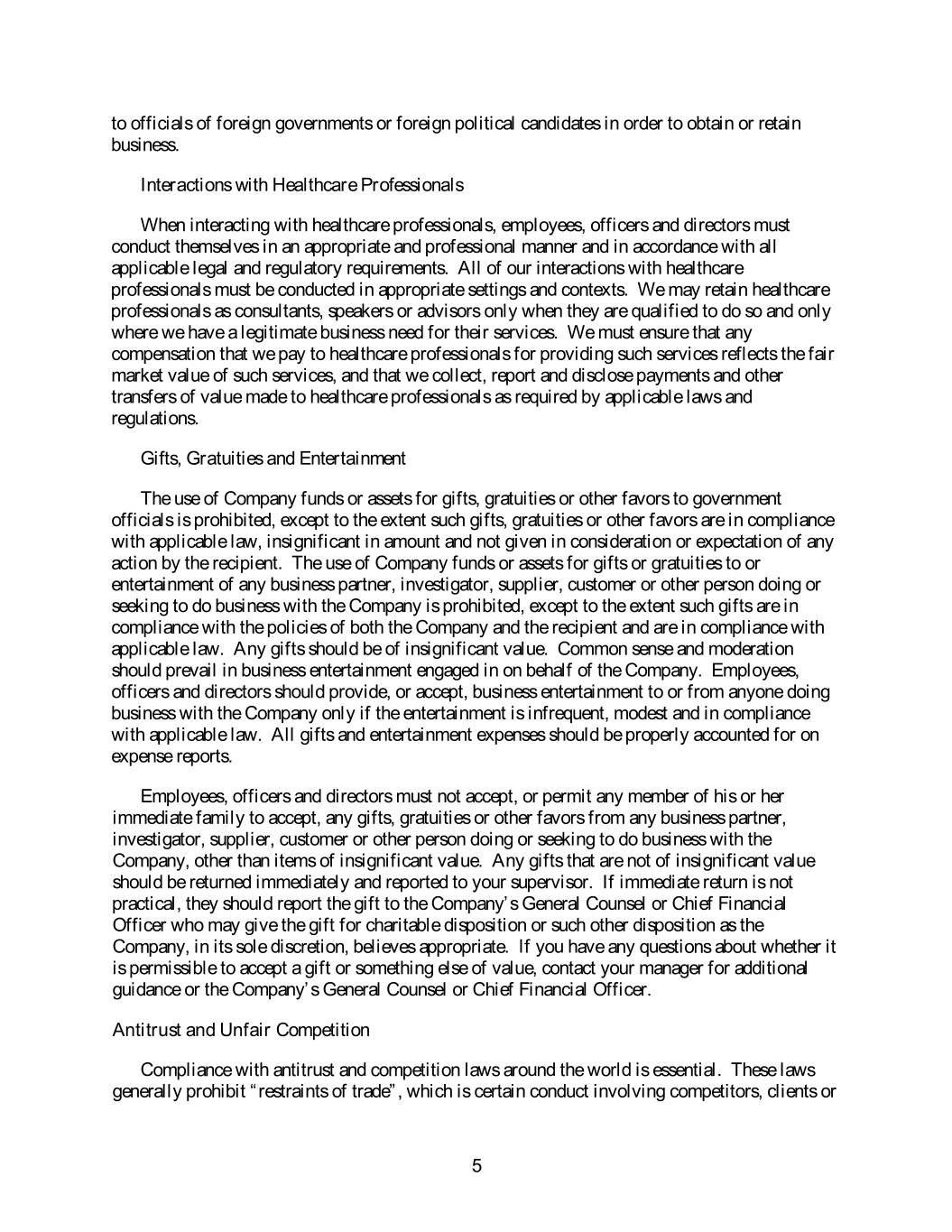
to officials of foreign governments or foreign political candidates in order to obtain or retain business. Interactions with Healthcare Professionals When interacting with healthcare professionals, employees, officers and directors must conduct themselves in an appropriate and professional manner and in accordance with all applicable legal and regulatory requirements. All of our interactions with healthcare professionals must be conducted in appropriate settings and contexts. We may retain healthcare professionals as consultants, speakers or advisors only when they are qualified to do so and only where we have a legitimate business need for their services. We must ensure that any compensation that we pay to healthcare professionals for providing such services reflects the fair market value of such services, and that we collect, report and disclose payments and other transfers of value made to healthcare professionals as required by applicable laws and regulations. Gifts, Gratuities and Entertainment The use of Company funds or assets for gifts, gratuities or other favors to government officials is prohibited, except to the extent such gifts, gratuities or other favors are in compliance with applicable law, insignificant in amount and not given in consideration or expectation of any action by the recipient. The use of Company funds or assets for gifts or gratuities to or entertainment of any business partner, investigator, supplier, customer or other person doing or seeking to do business with the Company is prohibited, except to the extent such gifts are in compliance with the policies of both the Company and the recipient and are in compliance with applicable law. Any gifts should be of insignificant value. Common sense and moderation should prevail in business entertainment engaged in on behalf of the Company. Employees, officers and directors should provide, or accept, business entertainment to or from anyone doing business with the Company only if the entertainment is infrequent, modest and in compliance with applicable law. All gifts and entertainment expenses should be properly accounted for on expense reports. Employees, officers and directors must not accept, or permit any member of his or her immediate family to accept, any gifts, gratuities or other favors from any business partner, investigator, supplier, customer or other person doing or seeking to do business with the Company, other than items of insignificant value. Any gifts that are not of insignificant value should be returned immediately and reported to your supervisor. If immediate return is not practical, they should report the gift to the Company’s General Counsel or Chief Financial Officer who may give the gift for charitable disposition or such other disposition as the Company, in its sole discretion, believes appropriate. If you have any questions about whether it is permissible to accept a gift or something else of value, contact your manager for additional guidance or the Company’s General Counsel or Chief Financial Officer. Antitrust and Unfair Competition Compliance with antitrust and competition laws around the world is essential. These laws generally prohibit “restraints of trade”, which is certain conduct involving competitors, clients or 5
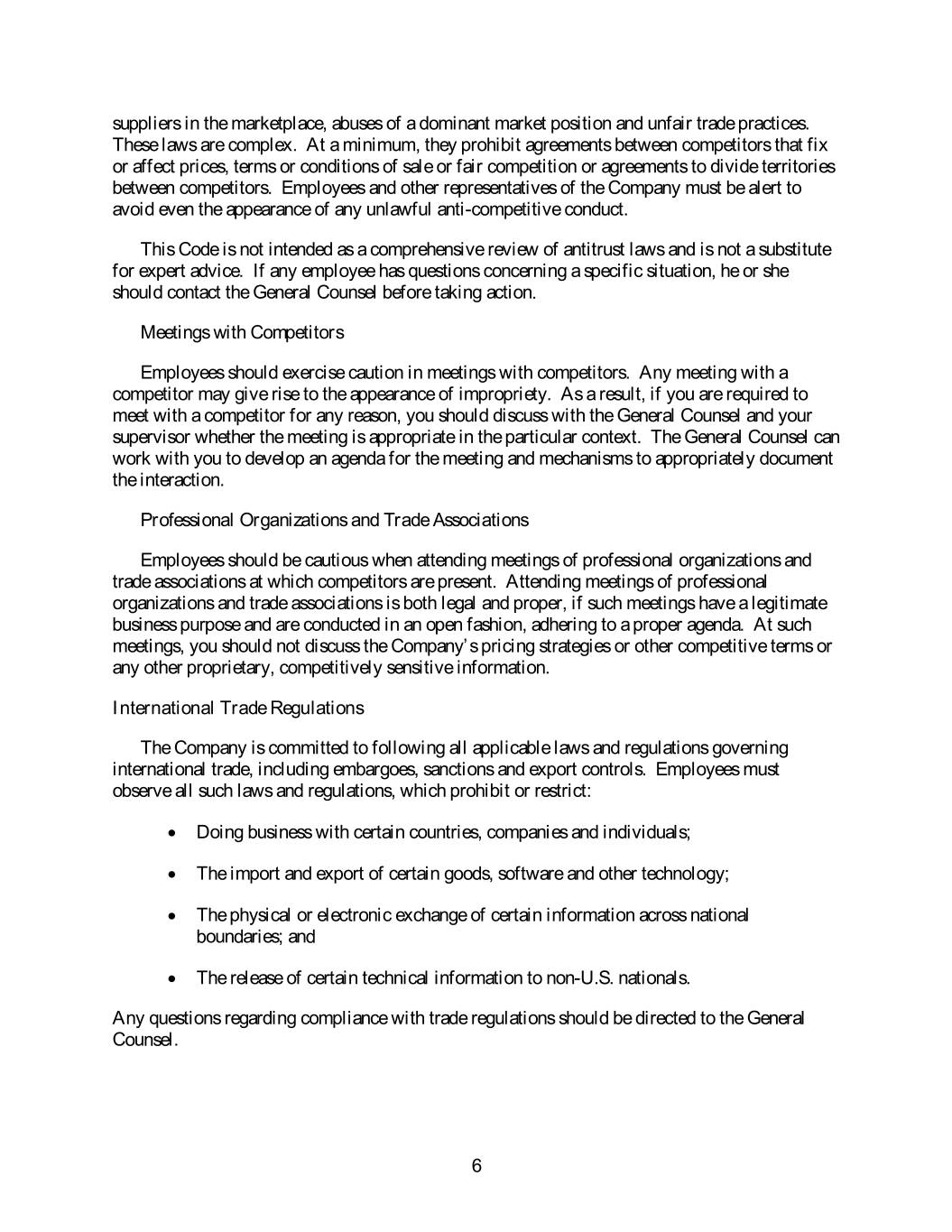
suppliers in the marketplace, abuses of a dominant market position and unfair trade practices. These laws are complex. At a minimum, they prohibit agreements between competitors that fix or affect prices, terms or conditions of sale or fair competition or agreements to divide territories between competitors. Employees and other representatives of the Company must be alert to avoid even the appearance of any unlawful anti-competitive conduct. This Code is not intended as a comprehensive review of antitrust laws and is not a substitute for expert advice. If any employee has questions concerning a specific situation, he or she should contact the General Counsel before taking action. Meetings with Competitors Employees should exercise caution in meetings with competitors. Any meeting with a competitor may give rise to the appearance of impropriety. As a result, if you are required to meet with a competitor for any reason, you should discuss with the General Counsel and your supervisor whether the meeting is appropriate in the particular context. The General Counsel can work with you to develop an agenda for the meeting and mechanisms to appropriately document the interaction. Professional Organizations and Trade Associations Employees should be cautious when attending meetings of professional organizations and trade associations at which competitors are present. Attending meetings of professional organizations and trade associations is both legal and proper, if such meetings have a legitimate business purpose and are conducted in an open fashion, adhering to a proper agenda. At such meetings, you should not discuss the Company’s pricing strategies or other competitive terms or any other proprietary, competitively sensitive information. International Trade Regulations The Company is committed to following all applicable laws and regulations governing international trade, including embargoes, sanctions and export controls. Employees must observe all such laws and regulations, which prohibit or restrict: • Doing business with certain countries, companies and individuals; • The import and export of certain goods, software and other technology; • The physical or electronic exchange of certain information across national boundaries; and • The release of certain technical information to non-U.S. nationals. Any questions regarding compliance with trade regulations should be directed to the General Counsel. 6
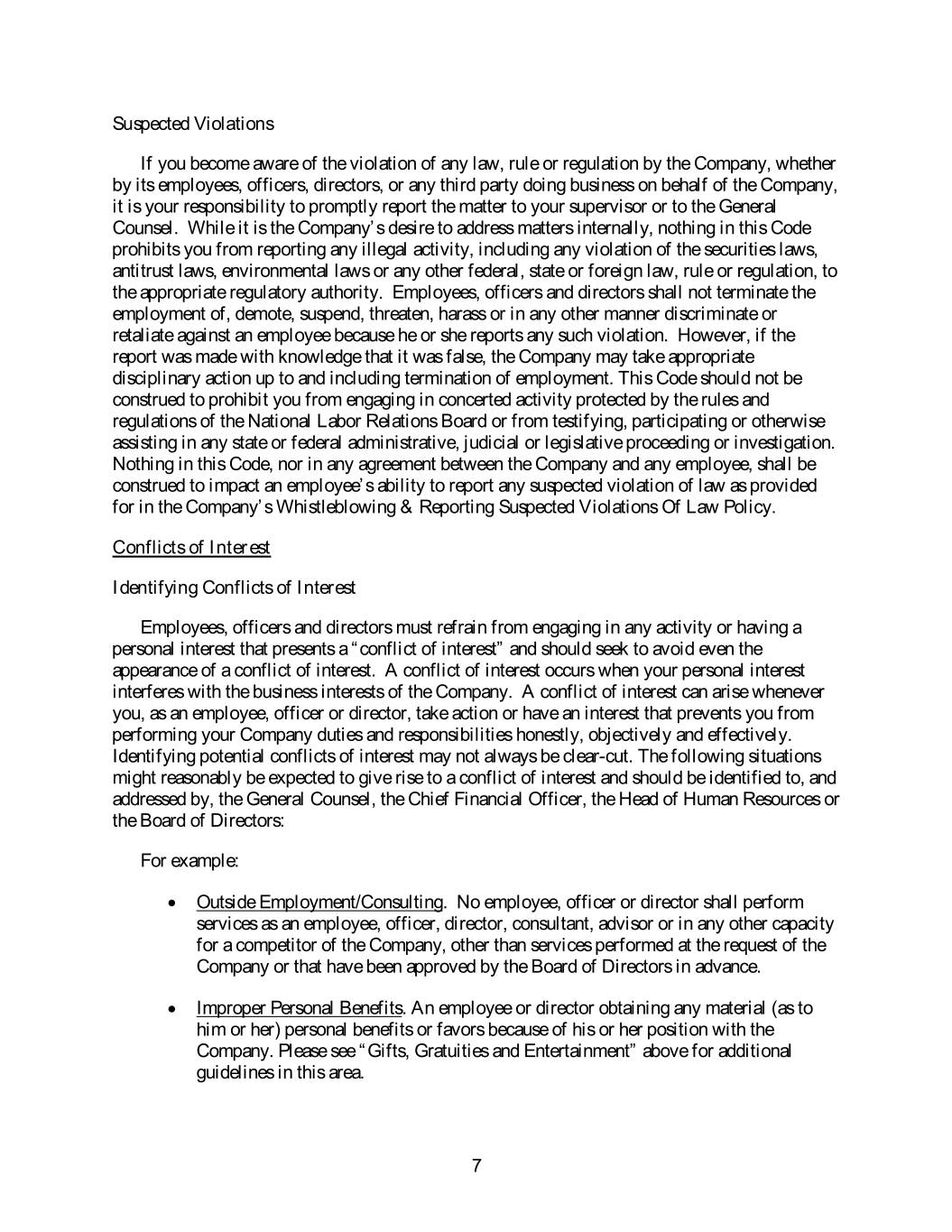
Suspected Violations If you become aware of the violation of any law, rule or regulation by the Company, whether by its employees, officers, directors, or any third party doing business on behalf of the Company, it is your responsibility to promptly report the matter to your supervisor or to the General Counsel. While it is the Company’s desire to address matters internally, nothing in this Code prohibits you from reporting any illegal activity, including any violation of the securities laws, antitrust laws, environmental laws or any other federal, state or foreign law, rule or regulation, to the appropriate regulatory authority. Employees, officers and directors shall not terminate the employment of, demote, suspend, threaten, harass or in any other manner discriminate or retaliate against an employee because he or she reports any such violation. However, if the report was made with knowledge that it was false, the Company may take appropriate disciplinary action up to and including termination of employment. This Code should not be construed to prohibit you from engaging in concerted activity protected by the rules and regulations of the National Labor Relations Board or from testifying, participating or otherwise assisting in any state or federal administrative, judicial or legislative proceeding or investigation. Nothing in this Code, nor in any agreement between the Company and any employee, shall be construed to impact an employee’s ability to report any suspected violation of law as provided for in the Company’s Whistleblowing & Reporting Suspected Violations Of Law Policy. Conflicts of Interest Identifying Conflicts of Interest Employees, officers and directors must refrain from engaging in any activity or having a personal interest that presents a “conflict of interest” and should seek to avoid even the appearance of a conflict of interest. A conflict of interest occurs when your personal interest interferes with the business interests of the Company. A conflict of interest can arise whenever you, as an employee, officer or director, take action or have an interest that prevents you from performing your Company duties and responsibilities honestly, objectively and effectively. Identifying potential conflicts of interest may not always be clear-cut. The following situations might reasonably be expected to give rise to a conflict of interest and should be identified to, and addressed by, the General Counsel, the Chief Financial Officer, the Head of Human Resources or the Board of Directors: For example: • Outside Employment/Consulting. No employee, officer or director shall perform services as an employee, officer, director, consultant, advisor or in any other capacity for a competitor of the Company, other than services performed at the request of the Company or that have been approved by the Board of Directors in advance. • Improper Personal Benefits. An employee or director obtaining any material (as to him or her) personal benefits or favors because of his or her position with the Company. Please see “Gifts, Gratuities and Entertainment” above for additional guidelines in this area. 7

• Service on Boards and Committees. An employee or director serving on a board of directors or trustees or on a committee of any entity (whether profit or not-for-profit) whose interests reasonably would be expected to conflict with those of the Company. • Financial Interest. No employee, officer or director shall have a financial interest in any company that they know or suspects is a material customer, supplier or competitor of the Company, other than a financial interest representing less than one percent (1%) of the outstanding shares of a publicly-held company; and no employee, officer or director shall use his or her position with the Company to influence a transaction with a supplier or customer in which such person has any personal interest, other than a financial interest representing less than one percent (1%) of the outstanding shares of a publicly-held company. • Loans or Other Financial Transactions. An employee or director obtaining loans or guarantees of personal obligations from, or entering into any other personal financial transaction with, any company or individual that the employee knows or suspects is a material customer, supplier or competitor of the Company. This guideline does not prohibit arms-length transactions with banks, brokerage firms or other financial institutions. • Actions of Family Members. The actions of family members outside the workplace may also give rise to the conflicts of interest described above because they may influence an employee’s or director’s objectivity in making decisions on behalf of the Company. For purposes of this Code, “family members” include your spouse or life- partner, brothers, sisters, parents, grandparents, in-laws and children whether such relationships are by blood or adoption. Disclosure of Conflicts of Interest The Company requires that employees and directors disclose any situation that reasonably would be expected to give rise to a conflict of interest. If you suspect that you have a situation that could give rise to a conflict of interest, or something that others could reasonably perceive as a conflict of interest, you must report it in writing to your supervisor or the Company’s General Counsel, or if you are a director or executive officer, to the Board of Directors. The Company’s General Counsel or the Board of Directors, as applicable, will work with you to determine whether you have a conflict of interest and, if so, how best to address it. All transactions that would give rise to a conflict of interest involving a director, executive officer or principal financial officer must be approved by the Board of Directors, and any such approval will not be considered a waiver of this Code. Insider Trading Employees, officers and directors who have material non-public information about the Company or other companies, including our suppliers and customers, as a result of their relationship with the Company are prohibited by law and Company policy from trading in securities of the Company or such other companies, as well as from communicating such information to others who might trade on the basis of that information. To help ensure that you 8

do not engage in prohibited insider trading and avoid even the appearance of an improper transaction, the Company has adopted an Insider Trading Policy, which has been distributed to you and is available from the Company’s General Counsel and in the Human Resources department. If you are uncertain about the constraints on your purchase or sale of any Company securities or the securities of any other company that you are familiar with by virtue of your relationship with the Company, you should consult with the General Counsel before making any such purchase or sale. Confidentiality and Data Privacy Company Proprietary Information Protecting confidential information is critical to our success in an innovation-driven industry. Employees, officers and directors are exposed to information about the Company that is confidential and proprietary. All information and know-how, whether or not in writing, of a private, secret or confidential nature concerning the Company’s business or financial affairs (collectively, “Proprietary Information”) is and shall be the exclusive property of the Company. By way of illustration, but not limitation, Proprietary Information may include discoveries; inventions; products; product improvements and enhancements; processes; methods; techniques; formulas; compositions; compounds; manufacturing ideas, techniques and data; negotiation strategies and positions; projects; developments; plans (including business plans and strategies, marketing and pricing strategies and financing and business development plans); research data and analyses; clinical data and analyses; other scientific data and analyses; financial data (including sales, costs, profits, pricing methods or projections of any of the foregoing), computer databases and programs (including software used pursuant to a license agreement); lists and records of employees, investigators, clinical trial sites, customers, prospects, business partners, vendors and other suppliers, and contacts at or knowledge of any of the foregoing. All Proprietary Information must be held in strict confidence by all employees, officers and directors (even after their association with the Company ends) and may be used only for Company business and not for personal purposes. Scientific Disclosures The Company’s success hinges on its ability to compete successfully through scientific innovation. Scientific information generated by or on behalf of the Company or its collaborators is a valuable asset that belongs to the Company. Any disclosure of such information must be coordinated carefully in accordance with a planned Company strategy and must not occur without a prior patent review and approval by appropriate internal Company experts and outside advisors. Disclosure of scientific information must also be made at appropriate times and through appropriate channels to avoid any allegation or appearance of selective disclosure, insider trading or pre-approval promotion. Any questions regarding disclosure of Company data in a particular context should be addressed to the General Counsel. 9
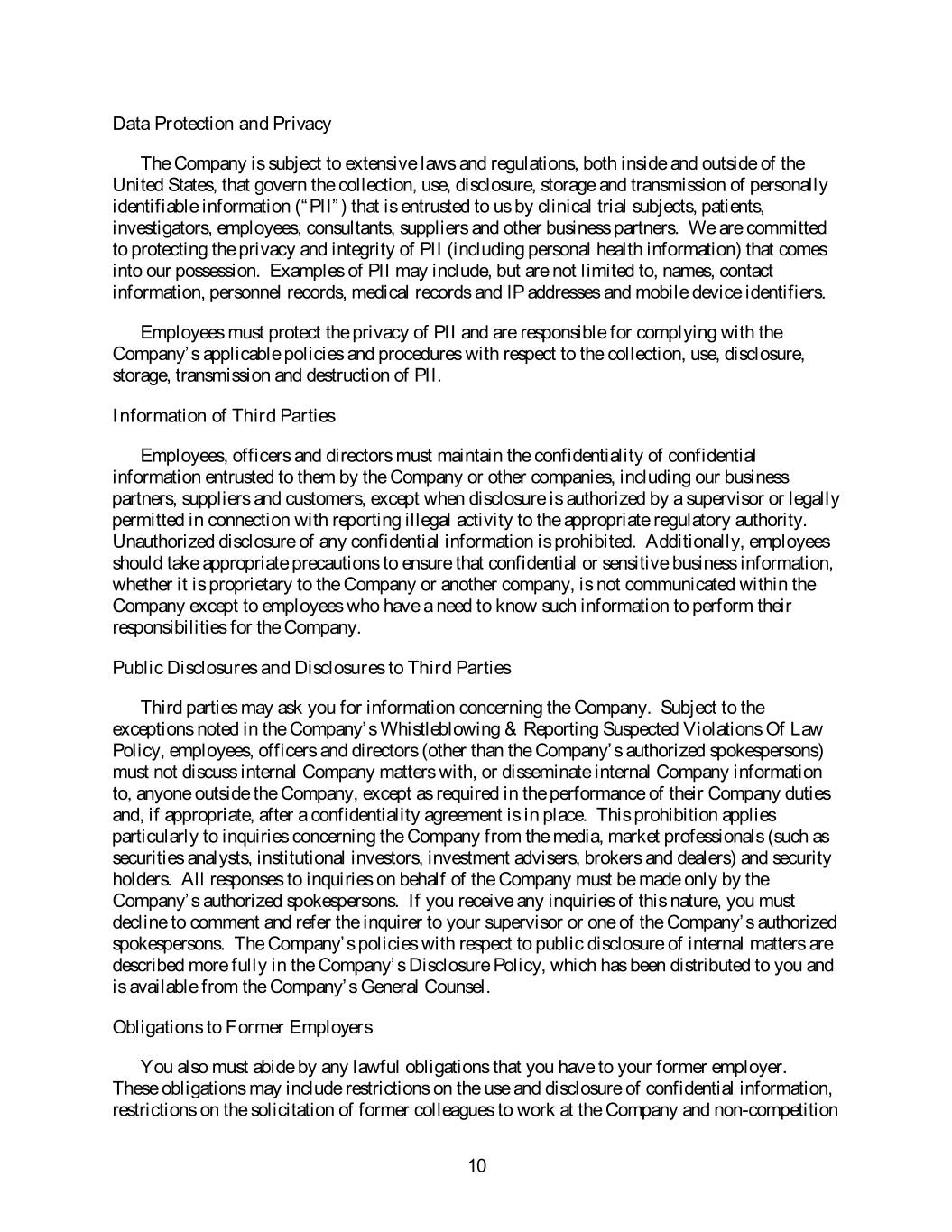
Data Protection and Privacy The Company is subject to extensive laws and regulations, both inside and outside of the United States, that govern the collection, use, disclosure, storage and transmission of personally identifiable information (“PII”) that is entrusted to us by clinical trial subjects, patients, investigators, employees, consultants, suppliers and other business partners. We are committed to protecting the privacy and integrity of PII (including personal health information) that comes into our possession. Examples of PII may include, but are not limited to, names, contact information, personnel records, medical records and IP addresses and mobile device identifiers. Employees must protect the privacy of PII and are responsible for complying with the Company’s applicable policies and procedures with respect to the collection, use, disclosure, storage, transmission and destruction of PII. Information of Third Parties Employees, officers and directors must maintain the confidentiality of confidential information entrusted to them by the Company or other companies, including our business partners, suppliers and customers, except when disclosure is authorized by a supervisor or legally permitted in connection with reporting illegal activity to the appropriate regulatory authority. Unauthorized disclosure of any confidential information is prohibited. Additionally, employees should take appropriate precautions to ensure that confidential or sensitive business information, whether it is proprietary to the Company or another company, is not communicated within the Company except to employees who have a need to know such information to perform their responsibilities for the Company. Public Disclosures and Disclosures to Third Parties Third parties may ask you for information concerning the Company. Subject to the exceptions noted in the Company’s Whistleblowing & Reporting Suspected Violations Of Law Policy, employees, officers and directors (other than the Company’s authorized spokespersons) must not discuss internal Company matters with, or disseminate internal Company information to, anyone outside the Company, except as required in the performance of their Company duties and, if appropriate, after a confidentiality agreement is in place. This prohibition applies particularly to inquiries concerning the Company from the media, market professionals (such as securities analysts, institutional investors, investment advisers, brokers and dealers) and security holders. All responses to inquiries on behalf of the Company must be made only by the Company’s authorized spokespersons. If you receive any inquiries of this nature, you must decline to comment and refer the inquirer to your supervisor or one of the Company’s authorized spokespersons. The Company’s policies with respect to public disclosure of internal matters are described more fully in the Company’s Disclosure Policy, which has been distributed to you and is available from the Company’s General Counsel. Obligations to Former Employers You also must abide by any lawful obligations that you have to your former employer. These obligations may include restrictions on the use and disclosure of confidential information, restrictions on the solicitation of former colleagues to work at the Company and non-competition 10
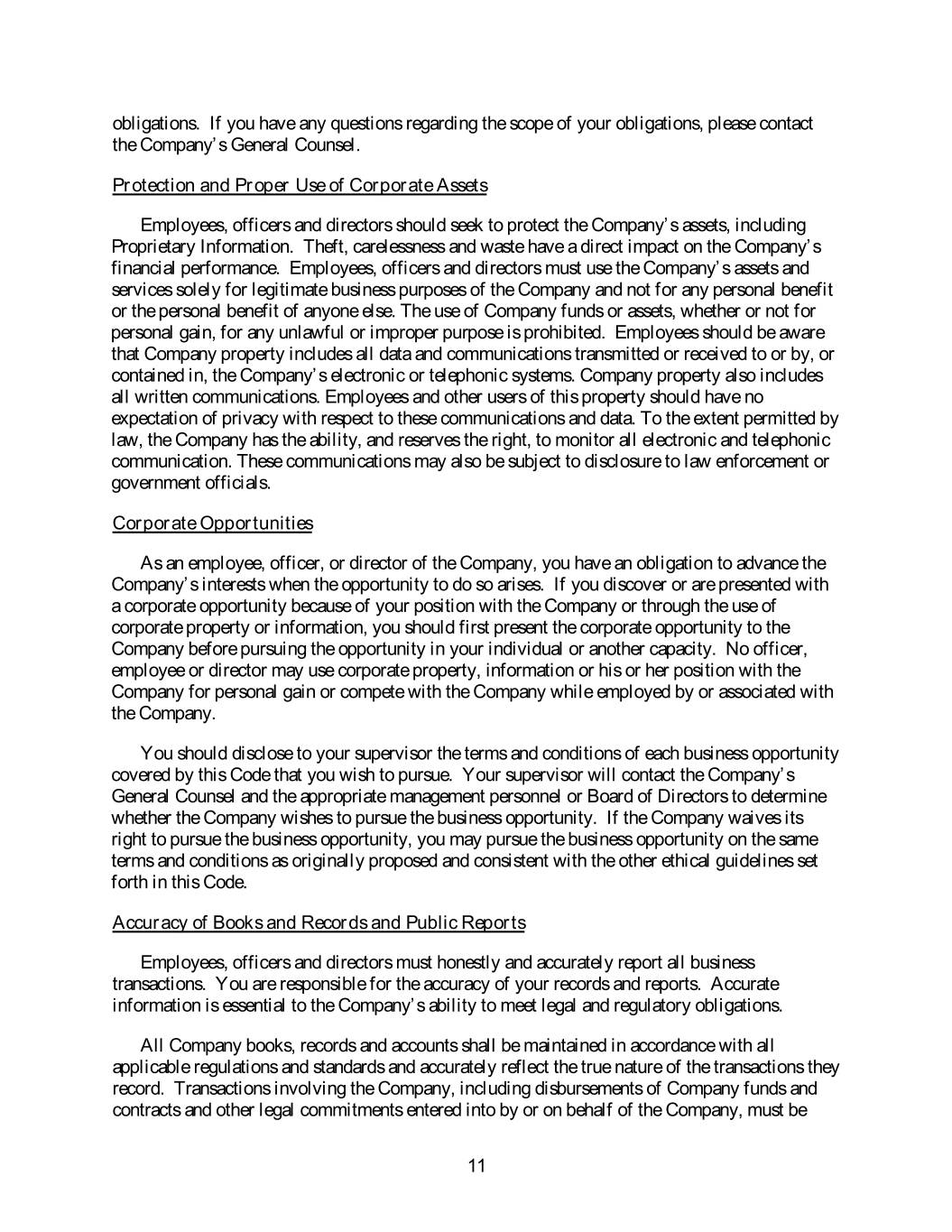
obligations. If you have any questions regarding the scope of your obligations, please contact the Company’s General Counsel. Protection and Proper Use of Corporate Assets Employees, officers and directors should seek to protect the Company’s assets, including Proprietary Information. Theft, carelessness and waste have a direct impact on the Company’s financial performance. Employees, officers and directors must use the Company’s assets and services solely for legitimate business purposes of the Company and not for any personal benefit or the personal benefit of anyone else. The use of Company funds or assets, whether or not for personal gain, for any unlawful or improper purpose is prohibited. Employees should be aware that Company property includes all data and communications transmitted or received to or by, or contained in, the Company’s electronic or telephonic systems. Company property also includes all written communications. Employees and other users of this property should have no expectation of privacy with respect to these communications and data. To the extent permitted by law, the Company has the ability, and reserves the right, to monitor all electronic and telephonic communication. These communications may also be subject to disclosure to law enforcement or government officials. Corporate Opportunities As an employee, officer, or director of the Company, you have an obligation to advance the Company’s interests when the opportunity to do so arises. If you discover or are presented with a corporate opportunity because of your position with the Company or through the use of corporate property or information, you should first present the corporate opportunity to the Company before pursuing the opportunity in your individual or another capacity. No officer, employee or director may use corporate property, information or his or her position with the Company for personal gain or compete with the Company while employed by or associated with the Company. You should disclose to your supervisor the terms and conditions of each business opportunity covered by this Code that you wish to pursue. Your supervisor will contact the Company’s General Counsel and the appropriate management personnel or Board of Directors to determine whether the Company wishes to pursue the business opportunity. If the Company waives its right to pursue the business opportunity, you may pursue the business opportunity on the same terms and conditions as originally proposed and consistent with the other ethical guidelines set forth in this Code. Accuracy of Books and Records and Public Reports Employees, officers and directors must honestly and accurately report all business transactions. You are responsible for the accuracy of your records and reports. Accurate information is essential to the Company’s ability to meet legal and regulatory obligations. All Company books, records and accounts shall be maintained in accordance with all applicable regulations and standards and accurately reflect the true nature of the transactions they record. Transactions involving the Company, including disbursements of Company funds and contracts and other legal commitments entered into by or on behalf of the Company, must be 11
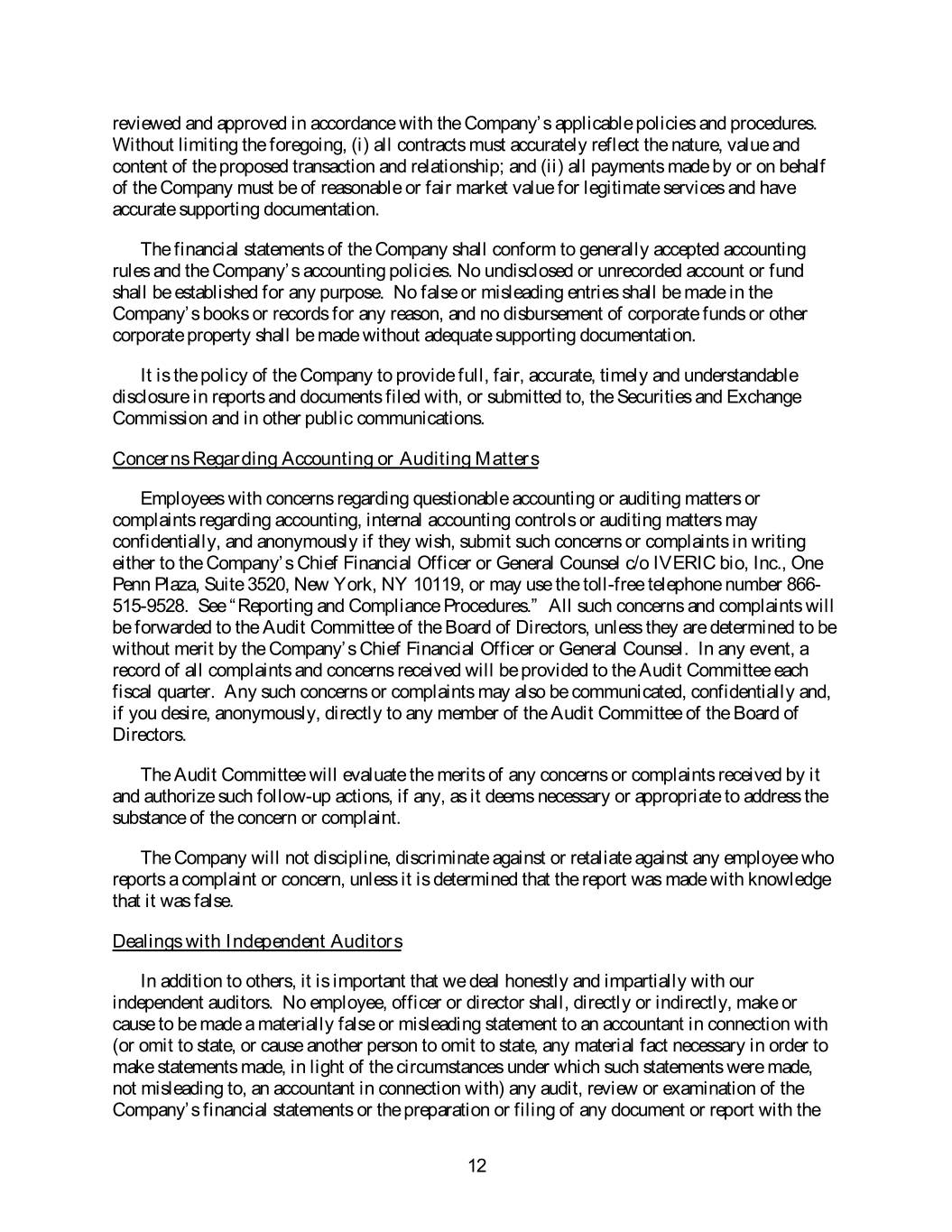
reviewed and approved in accordance with the Company’s applicable policies and procedures. Without limiting the foregoing, (i) all contracts must accurately reflect the nature, value and content of the proposed transaction and relationship; and (ii) all payments made by or on behalf of the Company must be of reasonable or fair market value for legitimate services and have accurate supporting documentation. The financial statements of the Company shall conform to generally accepted accounting rules and the Company’s accounting policies. No undisclosed or unrecorded account or fund shall be established for any purpose. No false or misleading entries shall be made in the Company’s books or records for any reason, and no disbursement of corporate funds or other corporate property shall be made without adequate supporting documentation. It is the policy of the Company to provide full, fair, accurate, timely and understandable disclosure in reports and documents filed with, or submitted to, the Securities and Exchange Commission and in other public communications. Concerns Regarding Accounting or Auditing Matters Employees with concerns regarding questionable accounting or auditing matters or complaints regarding accounting, internal accounting controls or auditing matters may confidentially, and anonymously if they wish, submit such concerns or complaints in writing either to the Company’s Chief Financial Officer or General Counsel c/o IVERIC bio, Inc., One Penn Plaza, Suite 3520, New York, NY 10119, or may use the toll-free telephone number 866- 515-9528. See “Reporting and Compliance Procedures.” All such concerns and complaints will be forwarded to the Audit Committee of the Board of Directors, unless they are determined to be without merit by the Company’s Chief Financial Officer or General Counsel. In any event, a record of all complaints and concerns received will be provided to the Audit Committee each fiscal quarter. Any such concerns or complaints may also be communicated, confidentially and, if you desire, anonymously, directly to any member of the Audit Committee of the Board of Directors. The Audit Committee will evaluate the merits of any concerns or complaints received by it and authorize such follow-up actions, if any, as it deems necessary or appropriate to address the substance of the concern or complaint. The Company will not discipline, discriminate against or retaliate against any employee who reports a complaint or concern, unless it is determined that the report was made with knowledge that it was false. Dealings with Independent Auditors In addition to others, it is important that we deal honestly and impartially with our independent auditors. No employee, officer or director shall, directly or indirectly, make or cause to be made a materially false or misleading statement to an accountant in connection with (or omit to state, or cause another person to omit to state, any material fact necessary in order to make statements made, in light of the circumstances under which such statements were made, not misleading to, an accountant in connection with) any audit, review or examination of the Company’s financial statements or the preparation or filing of any document or report with the 12
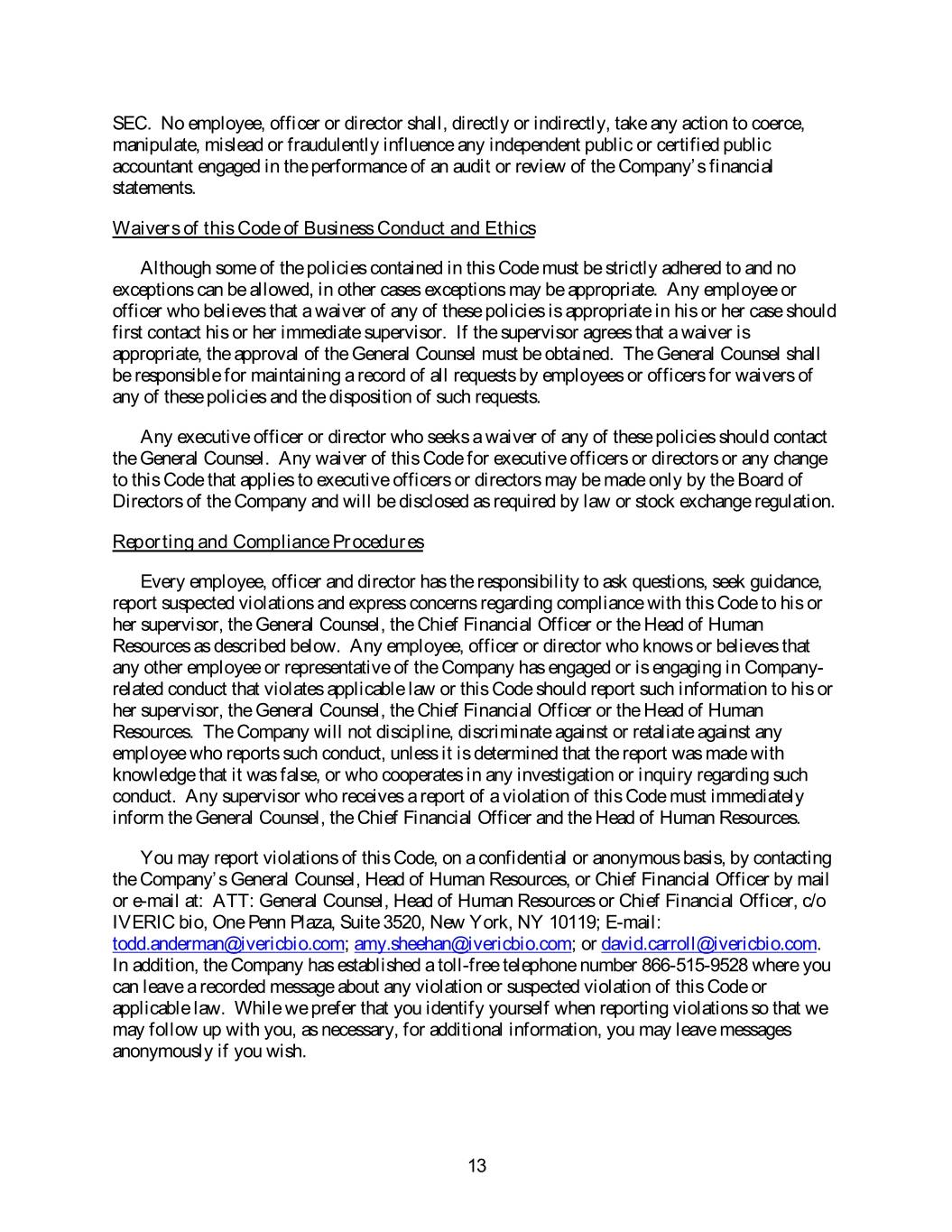
SEC. No employee, officer or director shall, directly or indirectly, take any action to coerce, manipulate, mislead or fraudulently influence any independent public or certified public accountant engaged in the performance of an audit or review of the Company’s financial statements. Waivers of this Code of Business Conduct and Ethics Although some of the policies contained in this Code must be strictly adhered to and no exceptions can be allowed, in other cases exceptions may be appropriate. Any employee or officer who believes that a waiver of any of these policies is appropriate in his or her case should first contact his or her immediate supervisor. If the supervisor agrees that a waiver is appropriate, the approval of the General Counsel must be obtained. The General Counsel shall be responsible for maintaining a record of all requests by employees or officers for waivers of any of these policies and the disposition of such requests. Any executive officer or director who seeks a waiver of any of these policies should contact the General Counsel. Any waiver of this Code for executive officers or directors or any change to this Code that applies to executive officers or directors may be made only by the Board of Directors of the Company and will be disclosed as required by law or stock exchange regulation. Reporting and Compliance Procedures Every employee, officer and director has the responsibility to ask questions, seek guidance, report suspected violations and express concerns regarding compliance with this Code to his or her supervisor, the General Counsel, the Chief Financial Officer or the Head of Human Resources as described below. Any employee, officer or director who knows or believes that any other employee or representative of the Company has engaged or is engaging in Company- related conduct that violates applicable law or this Code should report such information to his or her supervisor, the General Counsel, the Chief Financial Officer or the Head of Human Resources. The Company will not discipline, discriminate against or retaliate against any employee who reports such conduct, unless it is determined that the report was made with knowledge that it was false, or who cooperates in any investigation or inquiry regarding such conduct. Any supervisor who receives a report of a violation of this Code must immediately inform the General Counsel, the Chief Financial Officer and the Head of Human Resources. You may report violations of this Code, on a confidential or anonymous basis, by contacting the Company’s General Counsel, Head of Human Resources, or Chief Financial Officer by mail or e-mail at: ATT: General Counsel, Head of Human Resources or Chief Financial Officer, c/o IVERIC bio, One Penn Plaza, Suite 3520, New York, NY 10119; E-mail: todd.anderman@ivericbio.com; amy.sheehan@ivericbio.com; or david.carroll@ivericbio.com. In addition, the Company has established a toll-free telephone number 866-515-9528 where you can leave a recorded message about any violation or suspected violation of this Code or applicable law. While we prefer that you identify yourself when reporting violations so that we may follow up with you, as necessary, for additional information, you may leave messages anonymously if you wish. 13
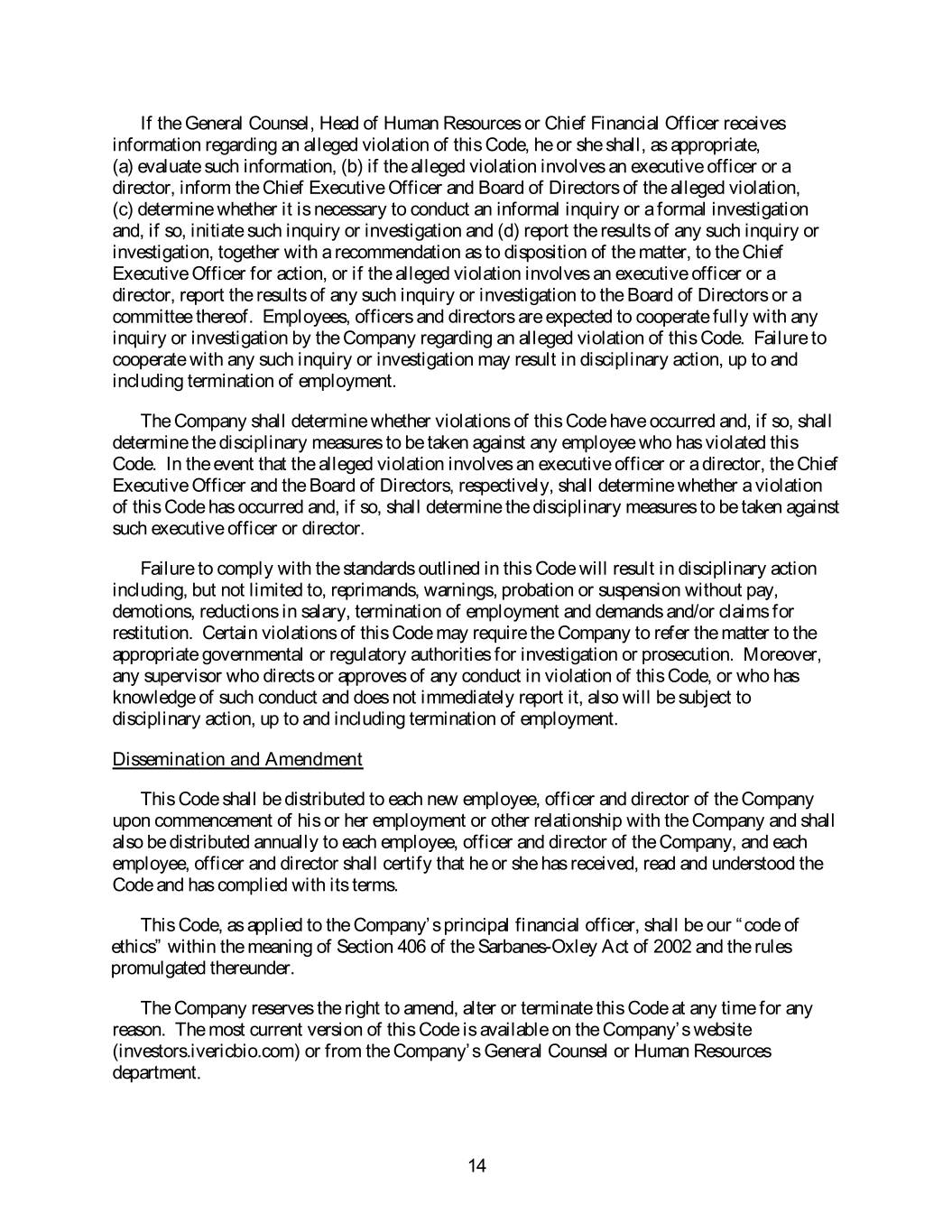
If the General Counsel, Head of Human Resources or Chief Financial Officer receives information regarding an alleged violation of this Code, he or she shall, as appropriate, (a) evaluate such information, (b) if the alleged violation involves an executive officer or a director, inform the Chief Executive Officer and Board of Directors of the alleged violation, (c) determine whether it is necessary to conduct an informal inquiry or a formal investigation and, if so, initiate such inquiry or investigation and (d) report the results of any such inquiry or investigation, together with a recommendation as to disposition of the matter, to the Chief Executive Officer for action, or if the alleged violation involves an executive officer or a director, report the results of any such inquiry or investigation to the Board of Directors or a committee thereof. Employees, officers and directors are expected to cooperate fully with any inquiry or investigation by the Company regarding an alleged violation of this Code. Failure to cooperate with any such inquiry or investigation may result in disciplinary action, up to and including termination of employment. The Company shall determine whether violations of this Code have occurred and, if so, shall determine the disciplinary measures to be taken against any employee who has violated this Code. In the event that the alleged violation involves an executive officer or a director, the Chief Executive Officer and the Board of Directors, respectively, shall determine whether a violation of this Code has occurred and, if so, shall determine the disciplinary measures to be taken against such executive officer or director. Failure to comply with the standards outlined in this Code will result in disciplinary action including, but not limited to, reprimands, warnings, probation or suspension without pay, demotions, reductions in salary, termination of employment and demands and/or claims for restitution. Certain violations of this Code may require the Company to refer the matter to the appropriate governmental or regulatory authorities for investigation or prosecution. Moreover, any supervisor who directs or approves of any conduct in violation of this Code, or who has knowledge of such conduct and does not immediately report it, also will be subject to disciplinary action, up to and including termination of employment. Dissemination and Amendment This Code shall be distributed to each new employee, officer and director of the Company upon commencement of his or her employment or other relationship with the Company and shall also be distributed annually to each employee, officer and director of the Company, and each employee, officer and director shall certify that he or she has received, read and understood the Code and has complied with its terms. This Code, as applied to the Company’s principal financial officer, shall be our “code of ethics” within the meaning of Section 406 of the Sarbanes-Oxley Act of 2002 and the rules promulgated thereunder. The Company reserves the right to amend, alter or terminate this Code at any time for any reason. The most current version of this Code is available on the Company’s website (investors.ivericbio.com) or from the Company’s General Counsel or Human Resources department. 14
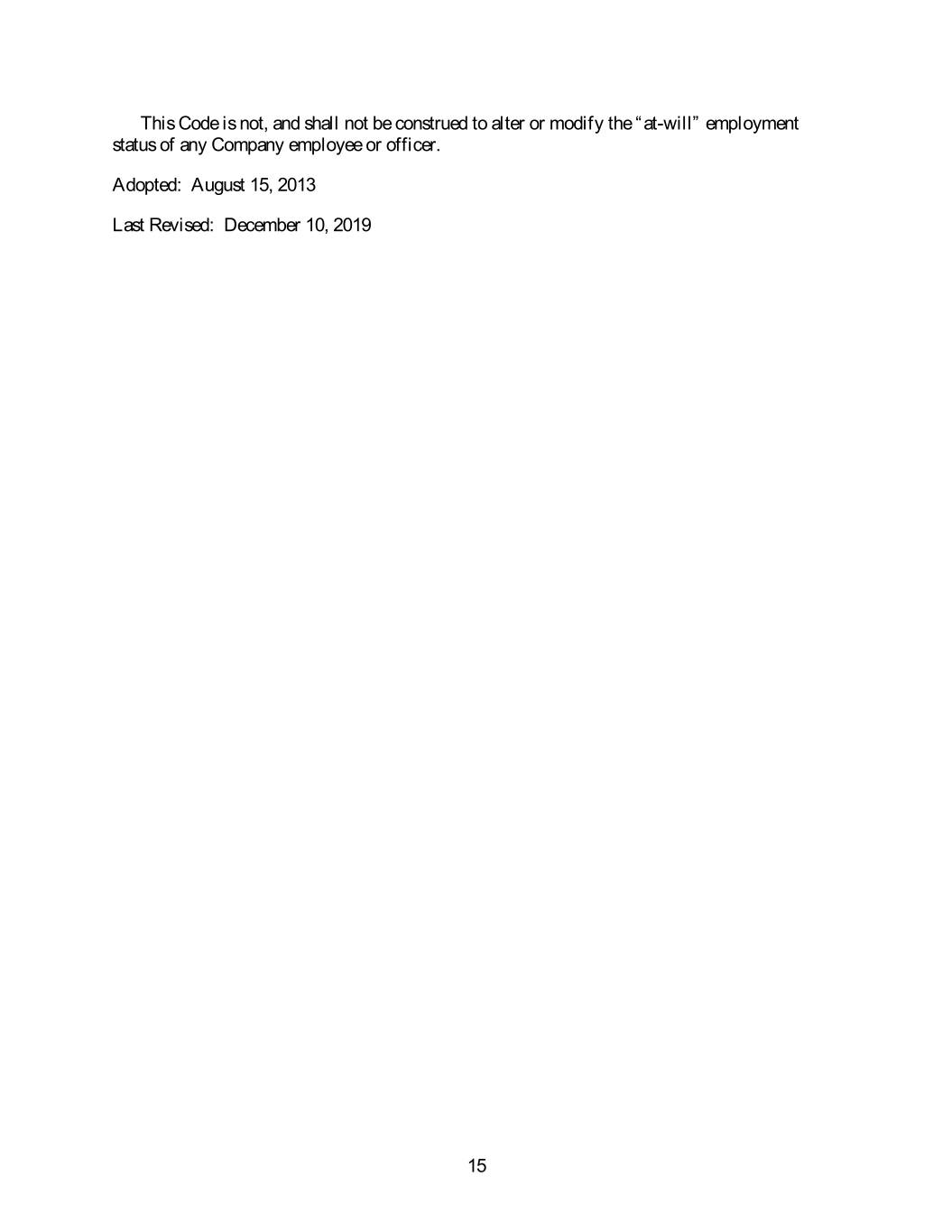
This Code is not, and shall not be construed to alter or modify the “at-will” employment status of any Company employee or officer. Adopted: August 15, 2013 Last Revised: December 10, 2019 15
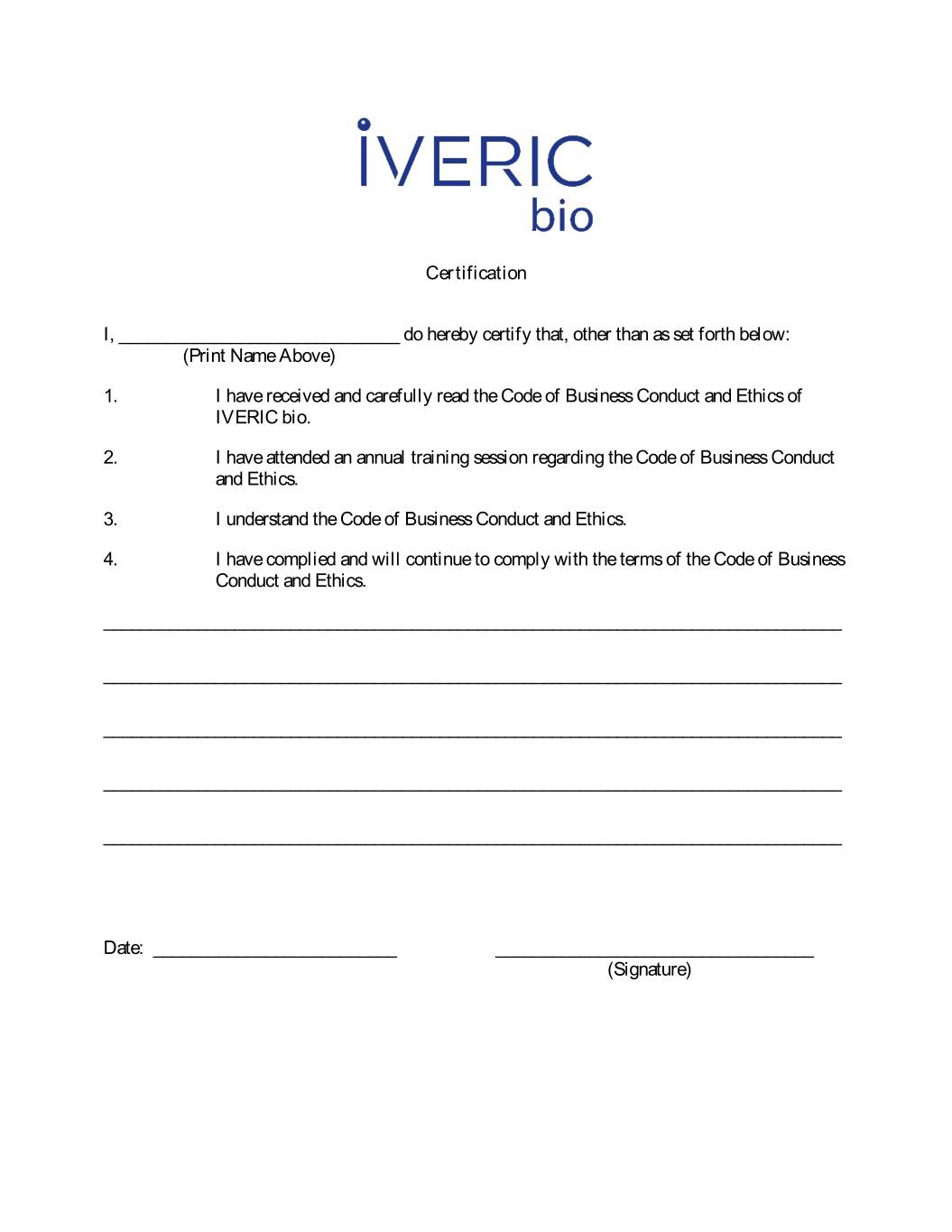
Certification I, ______________________________ do hereby certify that, other than as set forth below: (Print Name Above) 1. I have received and carefully read the Code of Business Conduct and Ethics of IVERIC bio. 2. I have attended an annual training session regarding the Code of Business Conduct and Ethics. 3. I understand the Code of Business Conduct and Ethics. 4. I have complied and will continue to comply with the terms of the Code of Business Conduct and Ethics. _______________________________________________________________________________ _______________________________________________________________________________ _______________________________________________________________________________ _______________________________________________________________________________ _______________________________________________________________________________ Date: __________________________ __________________________________ (Signature)
